Bahrain Cold Chain Market Outlook to 2029
By Market Structure, By Service Segments (Cold Storage, Cold Transportation), By End Users (Food and Beverage, Pharmaceuticals, Others), and By Region
- Product Code: TDR0200
- Region: Middle East
- Published on: June 2025
- Total Pages: 80
Report Summary
The report titled “Bahrain Cold Chain Market Outlook to 2029 - By Market Structure, By Service Segments (Cold Storage, Cold Transportation), By End Users (Food and Beverage, Pharmaceuticals, Others), and By Region” provides a comprehensive analysis of the cold chain market in Bahrain. The report covers an overview and genesis of the industry, overall market size in terms of revenue, market segmentation; trends and developments, regulatory landscape, customer-level profiling, issues and challenges, and comparative landscape including competition scenario, cross-comparison, opportunities and bottlenecks, and company profiling of major players in the Cold Chain Market. The report concludes with future market projections based on revenue, by service segments, end users, region, cause and effect relationship, and success case studies highlighting the major opportunities and cautions.
Bahrain Cold Chain Market Overview and Size
The Bahrain cold chain market reached a valuation of BHD 220 Million in 2023, driven by the surging demand for temperature-controlled logistics across sectors such as pharmaceuticals, food and beverages, and retail. The market is characterized by major players such as Agility Logistics, Almoayyed Logistics, DB Schenker Bahrain, and DHL Global Forwarding. These companies are recognized for their specialized cold storage facilities, temperature-controlled transportation services, and integrated logistics solutions.
In 2023, Agility Logistics expanded its cold storage capacity in Bahrain Logistics Zone to cater to the growing pharmaceutical and perishable food industries. This strategic expansion aims to strengthen Bahrain’s position as a regional logistics hub for temperature-sensitive goods. Manama and Hidd remain critical markets due to their proximity to key ports and industrial areas.
Market Size for Bahrain Cold Chain Industry on the Basis of Revenues in USD Million, 2018-2024
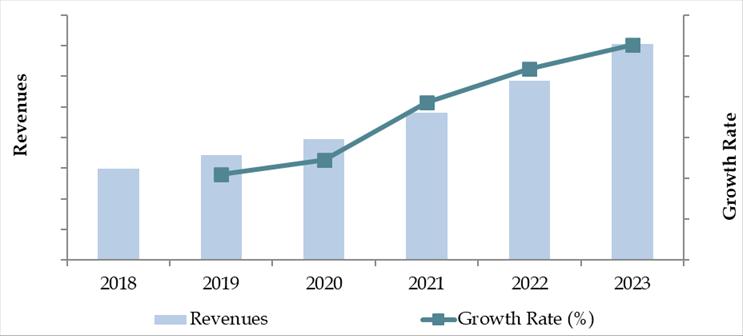
What Factors are Leading to the Growth of Bahrain Cold Chain Market:
Rising Pharmaceutical Imports: The healthcare sector’s increasing demand for vaccines, biologics, and temperature-sensitive medicines has significantly boosted the cold chain market. In 2023, pharmaceutical products accounted for approximately 28% of the total cold chain volume handled in Bahrain, as stringent storage requirements drive the need for specialized logistics services.
Food Consumption Trends: Bahrain's rising demand for imported fresh foods, dairy products, and frozen goods has spurred the expansion of cold storage and transportation facilities. Imports of frozen and perishable foods grew by 15% year-on-year in 2023, underlining the critical role of cold chain infrastructure in ensuring food security and quality.
Infrastructure Development: Government initiatives under Bahrain’s Economic Vision 2030 have emphasized infrastructure improvements, including logistics parks and free zones. In 2023, the Bahrain International Investment Park (BIIP) saw the opening of new cold chain facilities, offering businesses easy access to international markets via Bahrain International Airport and Khalifa Bin Salman Port.
Which Industry Challenges Have Impacted the Growth for Bahrain Cold Chain Market
High Operational Costs: The significant costs associated with maintaining cold storage facilities and refrigerated transportation, especially due to Bahrain’s extreme climate conditions, pose major challenges. According to a 2023 logistics industry survey, approximately 47% of cold chain operators reported difficulties in sustaining profitability because of high electricity and fuel costs. These costs often translate to higher service charges, limiting adoption among small and medium-sized enterprises.
Limited Skilled Workforce: A shortage of trained personnel specializing in cold chain management and temperature-sensitive logistics has impacted service quality. It is estimated that nearly 30% of cold chain service providers in Bahrain experience operational inefficiencies due to the lack of skilled technicians and warehouse managers capable of handling specialized storage requirements.
Infrastructure Gaps: Although Bahrain has made significant investments, the availability of world-class cold storage and last-mile refrigerated transportation is still limited outside key industrial zones like Manama and Hidd. In 2023, about 25% of perishables were reported to suffer delays or quality degradation due to insufficient cold infrastructure in peripheral areas, impacting customer confidence and market growth.
What are the Regulations and Initiatives which have Governed the Market:
Bahrain Logistics Zone (BLZ) Regulatory Framework: The Bahrain Logistics Zone mandates cold chain operators to comply with strict temperature monitoring and cargo handling guidelines. In 2023, compliance audits showed that over 80% of cold storage facilities within the BLZ adhered to international ISO standards for food and pharmaceutical logistics, boosting the sector's credibility among global clients.
Pharmaceutical Cold Chain Standards: Bahrain’s National Health Regulatory Authority (NHRA) enforces Good Distribution Practices (GDP) for the storage and transportation of pharmaceutical products. In 2023, the NHRA introduced enhanced inspection protocols that require real-time monitoring for all vaccine shipments, leading to a 12% increase in investments towards IoT-based cold chain solutions.
Food Safety Laws and Inspections: The Ministry of Health regulates cold storage standards for imported and domestically distributed perishable goods. Regular inspections ensure that cold storage providers maintain safe temperature ranges and hygiene standards. In 2023, authorities conducted more than 1,500 inspections, resulting in a compliance rate of 88%, thereby improving consumer trust and reducing spoilage rates.
Bahrain Cold Chain Market Segmentation
By Market Structure: The organized cold chain segment dominates the market, driven by strict compliance requirements from industries like pharmaceuticals and food retail. Organized players offer end-to-end cold storage and transportation services with assured quality standards, making them the preferred choice for large-scale importers and exporters. Unorganized players still cater to smaller businesses, particularly in local perishable food distribution, but face challenges regarding consistent service quality and regulatory compliance.
By Service Type: Cold storage services account for a larger share of the market compared to cold transportation, as the demand for long-term storage of pharmaceuticals, dairy products, and frozen foods is growing rapidly. However, cold transportation services are also gaining traction, particularly for last-mile deliveries and distribution of perishable goods across Bahrain’s key urban centers.
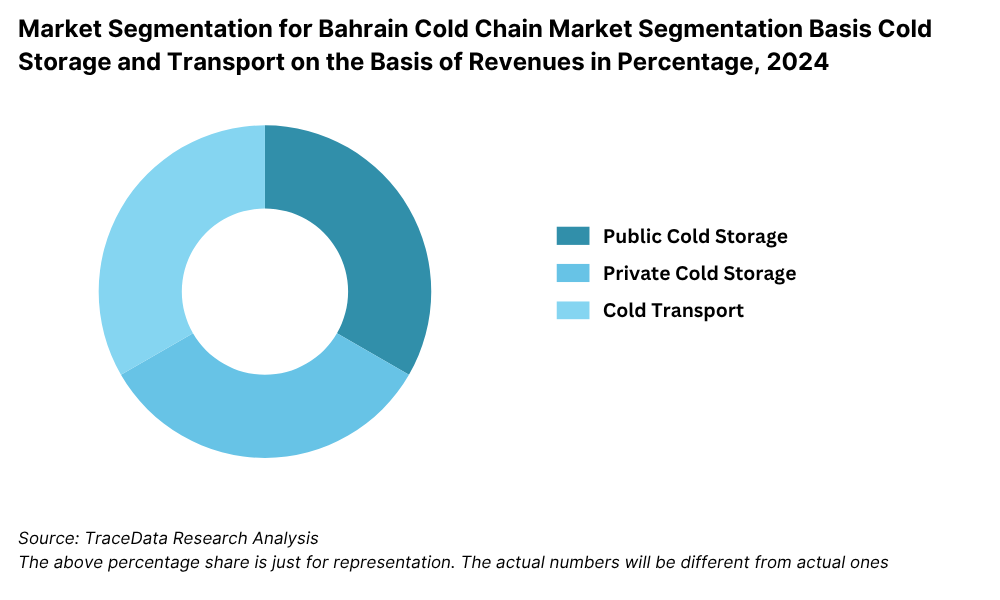
By End Users: The food and beverage sector remains the largest end-user segment, fueled by the high consumption of frozen foods, dairy, and imported fruits and vegetables. The pharmaceutical sector is the fastest-growing segment, driven by the increasing demand for vaccine storage, biologics, and temperature-sensitive medications. Other sectors such as chemicals and retail are also contributing moderately to cold chain demand.
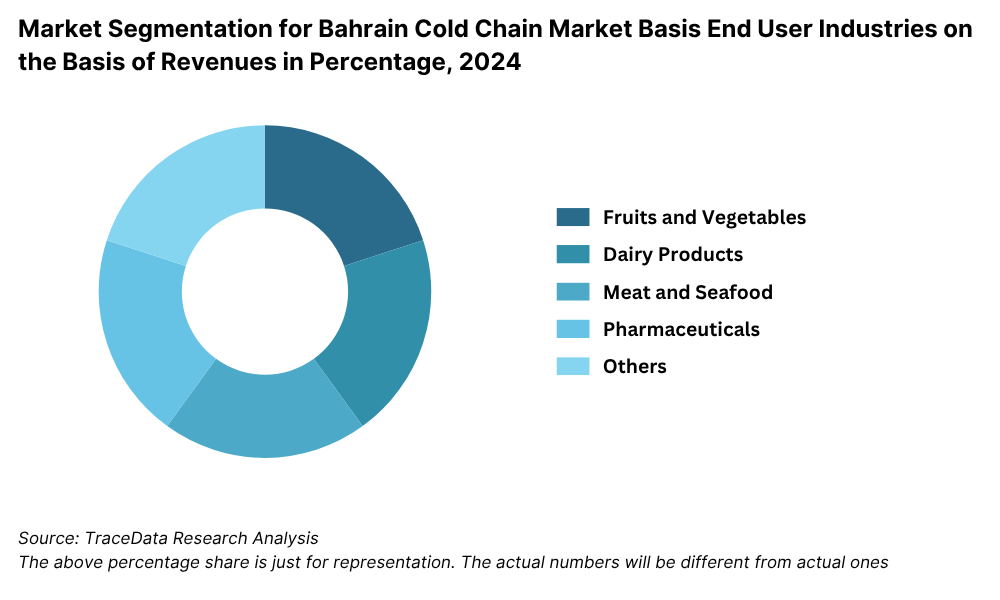
Competitive Landscape in Bahrain Cold Chain Market
The Bahrain cold chain market is moderately consolidated, with a mix of leading international logistics providers and strong regional players. Companies such as Agility Logistics, Almoayyed Logistics, DB Schenker Bahrain, DHL Global Forwarding, and GAC Bahrain are actively expanding their presence. The entry of technology-driven cold chain providers and infrastructure investments in logistics zones have further diversified service offerings, providing customers with enhanced efficiency and reliability.
Company Name | Founding Year | Original Headquarters |
Al Kooheji Freight & Logistics (Cold Chain) | 1978 | Manama, Bahrain |
Takhzeen Logistics (Cold Storage Division) | 2007 | Manama, Bahrain |
Bahrain Logistics Services (BLS) | 1997 | Manama, Bahrain |
Kanoo Logistics (Cold Chain Solutions) | 1890 (Bahrain ops: ~1960s) | Manama, Bahrain |
Agility Logistics Bahrain | 1979 (BH: ~2005) | Kuwait City, Kuwait |
Aramex Bahrain (Temperature-Controlled Freight) | 1982 | Dubai, UAE |
Al Madina Logistics (Bahrain Operations) | 2007 | Muscat, Oman |
DHL Global Forwarding Bahrain | 1969 (BH: ~1980s) | Bonn, Germany |
DB Schenker Bahrain (Cold Chain Services) | 1872 (BH: ~2000s) | Essen, Germany |
Kuehne + Nagel Bahrain (Pharma & Perishables) | 1890 (BH: ~2000s) | Schindellegi, Switzerland |
Maersk Bahrain (Cold Chain Solutions) | 1904 (BH: ~2000s) | Copenhagen, Denmark |
CEVA Logistics Bahrain | 2006 (BH: ~2010s) | Marseille, France |
FedEx Bahrain (via local partner) | 1971 (BH: ~1990s) | Memphis, USA |
UPS Bahrain (via authorized provider) | 1907 (BH: ~1990s) | Atlanta, USA |
Some of the recent competitor trends and key information about competitors include:
Agility Logistics: One of the region’s leading logistics companies, Agility expanded its Bahrain cold storage capacity by 15% in 2023 to cater to growing demand from pharmaceutical and food sectors. Their new state-of-the-art facility offers real-time temperature tracking and customized solutions for diverse industries.
Almoayyed Logistics: A well-established Bahraini logistics provider, Almoayyed invested in upgrading its refrigerated fleet in 2023, increasing cold transportation capacity by 18%. Their focus remains on providing flexible, end-to-end cold chain solutions across Bahrain and the GCC.
DB Schenker Bahrain: DB Schenker has positioned itself strongly in pharma cold chain logistics, partnering with leading pharmaceutical distributors in 2023. Their emphasis on GDP-certified facilities and advanced monitoring systems has strengthened their brand among healthcare clients.
DHL Global Forwarding: DHL expanded its cold chain services in Bahrain in 2023 by integrating IoT-based cold chain management for high-value shipments. Their solutions now cater to high-risk sectors including biologics and specialty foods.
GAC Bahrain: GAC has diversified its cold chain offerings by adding specialized services for e-commerce groceries and retail perishables. In 2023, GAC Bahrain reported a 12% year-on-year growth in cold chain logistics volume, driven by rising demand from online grocery platforms and food retailers.
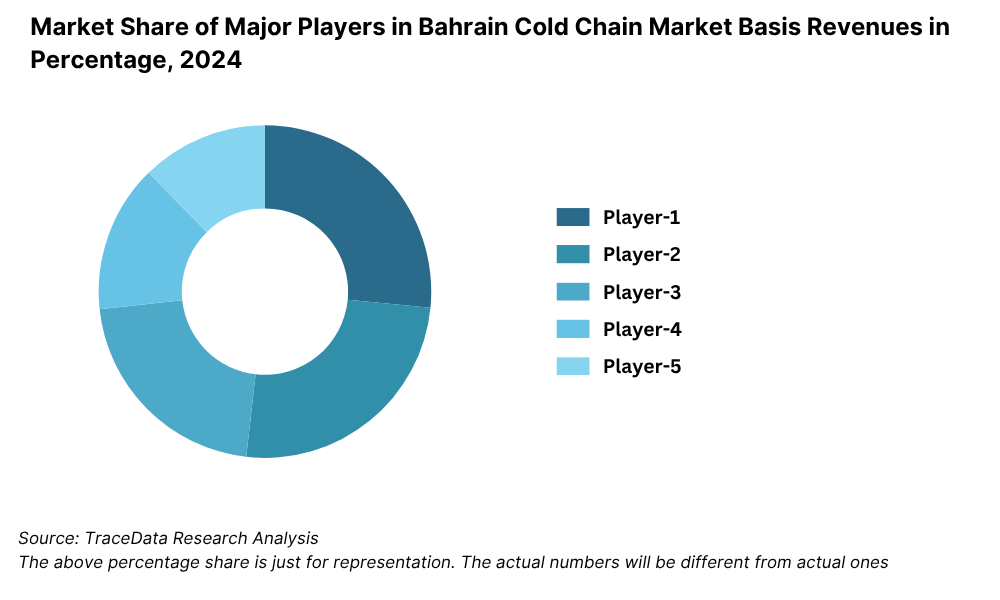
What Lies Ahead for Bahrain Cold Chain Market?
The Bahrain cold chain market is projected to grow steadily by 2029, exhibiting a healthy CAGR during the forecast period. This growth is expected to be fueled by increasing pharmaceutical imports, the rising demand for perishable foods, infrastructure development, and the adoption of advanced technologies across logistics operations.
Expansion of Pharmaceutical Cold Chain: With growing healthcare needs and an increasing number of biologics and temperature-sensitive medicines entering the Bahraini market, there is anticipated to be significant investment in pharmaceutical cold chain logistics. Enhanced storage standards and regulatory compliance will drive demand for specialized cold storage and transportation solutions.
Growth of E-Commerce in Perishables: The surge in online grocery shopping and food delivery services is expected to fuel demand for cold chain services, particularly for last-mile refrigerated transportation. E-commerce players and food delivery companies will increasingly partner with cold chain providers to ensure the freshness and quality of their offerings.
Technology Integration in Cold Chain Management: The adoption of IoT, real-time temperature monitoring, blockchain for shipment tracking, and AI-driven predictive analytics is projected to transform the cold chain landscape in Bahrain. These technologies will help improve operational efficiency, reduce spoilage rates, and enhance customer trust.
Development of Regional Logistics Hubs: Bahrain’s strategic location and its government’s initiatives to establish the country as a key regional logistics hub will continue to attract investments in cold chain infrastructure. Expansion of cold storage capacities in the Bahrain Logistics Zone and proximity to ports will make Bahrain an attractive distribution center for GCC countries.
Future Outlook and Projections for Bahrain Cold Chain Market on the Basis of Revenues in USD Million, 2024-2029
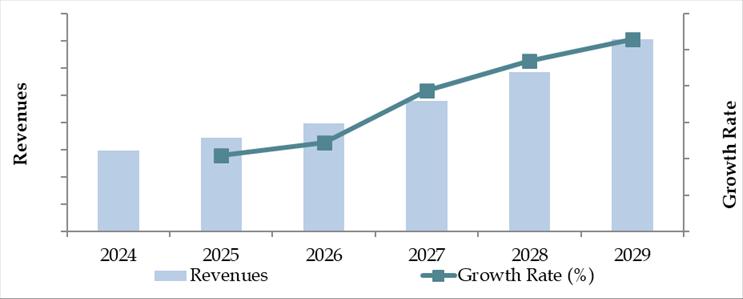
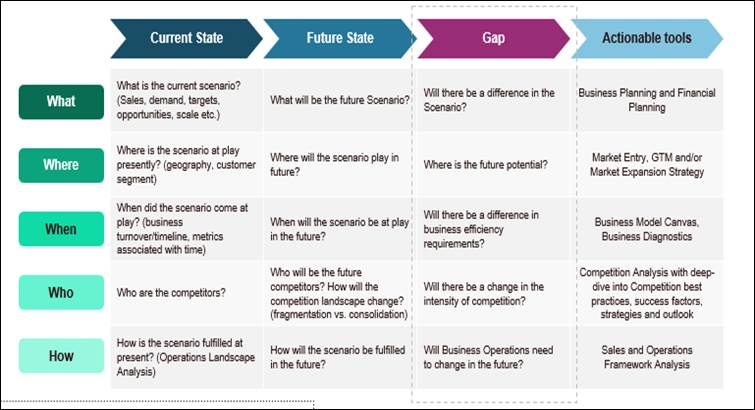
Bahrain Cold Chain Market Segmentation
• By Market Structure:
o Organized Cold Chain Providers
o Unorganized Cold Chain Providers
o Third-Party Logistics (3PL) Providers
o In-house Cold Chain Operations
• By Service Type:
o Cold Storage Services
o Cold Transportation Services
• By End User Industry:
o Food and Beverage
o Pharmaceuticals and Healthcare
o Retail and E-commerce
o Chemicals and Industrial Products
• By Temperature Range:
o Chilled (0°C to 5°C)
o Frozen (-18°C and below)
o Deep Frozen (-25°C and below)
• By Storage Type:
o Refrigerated Warehouses
o Blast Freezers
o Controlled Atmosphere Storage
• By Transportation Mode:
o Refrigerated Trucks
o Refrigerated Containers
o Air Cargo
o Sea Freight
• By Region:
o Manama
o Hidd
o Muharraq
o Sitra
o Riffa
Players Mentioned in the Report:
- Agility Logistics
- Kuehne + Nagel Bahrain (Cold Chain Services)
- DHL Global Forwarding (Cold Chain Division)
- Maersk Cold Chain Services
- United Cold Storage Co.
- Gulf Cold Stores W.L.L.
- National Cold Storage Co.
- Four Winds Cold Chain
- Bahrain Cold Store Company
- Mena Cold Storage & Logistics
- Sofu Global Logistics (temperature-controlled)
- Trans Gulf Logistics (Refrigerated Solutions)
- Gulf Star Cold Chain Service
Key Target Audience:
• Cold Storage Companies
• Cold Transportation Service Providers
• Pharmaceutical Distributors
• Food and Beverage Importers
• Retail and E-commerce Companies
• Regulatory Bodies (e.g., Bahrain Economic Development Board, Ministry of Health)
• Investment and Infrastructure Development Firms
Time Period:
• Historical Period: 2018–2023
• Base Year: 2024
• Forecast Period: 2024–2029
Report Coverage
Choose individual sections to purchase. Mix and match as you like.
6.1. Revenues, 2018-2024P
7.1. By Cold Storage and Cold Transport, 2023-2024P
7.2. By End-User Application (Dairy Products, Meat and Seafood, Pharmaceuticals, Fruits and Vegetables and Others), 2023-2024P
7.3. By Ownership (Owned and 3PL Cold Chain Facilities), 2023-2024P
10.1. Bahrain Cold Storage Market Size
10.1.1. By Revenue, 2018-2024P
10.1.2. By Number of Pallets, 2018-2024P
10.2. Bahrain Cold Storage Market Segmentation
10.2.1. By Temperature Range (Ambient, Chilled and Frozen), 2023-2024P
10.2.2. By End-User Application (Dairy Products, Meat and Seafood, Pharmaceuticals, Fruits and Vegetables and Others), 2023-2024P
10.2.3. By Major Cities, 2023-2024P
10.3. Bahrain Cold Storage Market Future Outlook and Projections, 2025-2029
10.3.1. By Temperature Range (Ambient, Chilled and Frozen), 2025-2029
10.3.2. By Major Cities, 2025-2029
11.1. Bahrain Cold Transport Market Size (By Revenue and Number of Reefer Trucks), 2018-2024P
11.2. Bahrain Cold Transport Market Segmentation
11.2.1. By Mode of Transportation (Land, Sea and Air), 2023-2024P
11.2.2. By Location (Domestic and International), 2023-2024P
11.3. Bahrain Cold Transport Market Future Outlook and Projections, 2025-2029
11.3.1. By Mode of Transport (Land, Sea and Air), 2025-2029
11.3.2. By Location (Domestic and International), 2025-2029
12.1. Trends and Developments in Bahrain Cold Chain Market
12.2. Issues and Challenges in Bahrain Cold Chain Market
12.3. Decision Making Parameters for End Users in Bahrain Cold Chain Market
12.4. SWOT Analysis of Bahrain Cold Chain Industry
12.5. Government Regulations and Associations in Bahrain Cold Chain Market
12.6. Macroeconomic Factors Impacting Bahrain Cold Chain Market
13.1. Parameters to be covered for Each End Users to Determine Business Potential:
13.1.1. Production Clusters
13.1.2. Market Demand, Major Products Stored, Cold Storage Companies in Guwahati catering to End Users
13.1.3. Location Preference for Each End User and their Production Plants, Preferences for Outsourcing and Captive Facility, Services Required, Facility Preferences, Decision Making Parameters
13.1.4. Cross comparison of leading end users/companies based on Headquarters, Manufacturing Plants, Products Stored, Major Products, Total Production, Cold Chain Partner, Facility Outsourced/Captive, Pallets Owned/Hired, Contact Person, Address and others
16.1. Competitive Landscape in Bahrain Cold Chain Market
16.2. Competition Scenario in Bahrain Cold Chain Market (Competition Stage, Major Players, Competing Parameters)
16.3. Key Metrics (Temperature Range, Pallet Position, Prices Charged, Occupancy Rate, Revenue (2023) and Employee Base) for Major Players in Bahrain Cold Chain Market
16.4. Company Profiles of Major Companies in Bahrain Cold Chain Market (Year of Establishment, Company Overview, Service Offered, USP, Warehousing Facilities, Warehousing Price, Cold Storage by location, Occupancy Rate, Major Clientele, Industries Catered, Employee Base, Temperature Range, Topline OPEX*, Revenue, Recent Developments, Future Strategies)
16.5. Strength and Weakness
16.6. Operating Model Analysis Framework
16.7. Gartner Magic Quadrant
16.8. Bowmans Strategic Clock for Competitive Advantage
17.1. Revenues, 2025-2029
18.1. By Cold Storage and Cold Transport, 2025-2029
18.2. By End-User Application (Dairy Products, Meat and Seafood, Pharmaceuticals, Fruits and Vegetables and Others), 2025-2029
18.3. By Ownership (Owned and 3PL Cold Chain Facilities), 2025-2029
18.4. Recommendations
18.5. Opportunity Analysis
Research Methodology
Step 1: Ecosystem Creation
Map the ecosystem and identify all the demand side and supply side entities for Bahrain Cold Chain Market. Based on this ecosystem, we shortlist leading 5–6 service providers in the country based upon their financial information, service capacities (cold storage and transportation volumes), and client portfolios.
Sourcing is made through industry articles, multiple secondary, and proprietary databases to perform desk research around the market to collate industry-level information.
Step 2: Desk Research
Subsequently, we engage in an exhaustive desk research process by referencing diverse secondary and proprietary databases. This approach enables us to conduct a thorough analysis of the market, aggregating industry-level insights. We delve into aspects like total cold storage capacities, number of market players, service pricing trends, demand for different temperature ranges, and growth drivers. We supplement this with detailed examinations of company-level data, relying on sources like press releases, annual reports, operational disclosures, and related documents. This process aims to construct a foundational understanding of both the Bahrain cold chain market and the entities operating within it.
Step 3: Primary Research
We initiate a series of in-depth interviews with C-level executives, operational heads, and other stakeholders representing various Bahrain cold chain companies and end-users across sectors like food, pharmaceuticals, and retail. This interview process serves a multi-faceted purpose: to validate market hypotheses, authenticate statistical data, and extract valuable operational and financial insights from these industry representatives. A bottom-to-top approach is undertaken to evaluate service volumes and capacities for each player thereby aggregating to the overall market structure.
As part of our validation strategy, our team executes disguised interviews wherein we approach each company under the guise of potential customers or service collaborators. This approach enables us to validate the operational and financial information shared by company executives, corroborating this data against what is available in secondary databases. These interactions also provide us with a comprehensive understanding of cold chain service processes, revenue streams, value chain dynamics, and pricing factors.
Step 4: Sanity Check
- Bottom-to-top and top-to-bottom analysis along with market size modeling exercises is undertaken to conduct the sanity check process. This ensures that the derived market figures are logical, balanced, and reflective of both supply and demand side dynamics.
FAQs
1. What is the potential for the Bahrain Cold Chain Market?
The Bahrain cold chain market is poised for steady growth, reaching a valuation of BHD 220 Million in 2023. This expansion is driven by the rising demand for temperature-sensitive logistics services across food, pharmaceutical, and retail sectors. The country’s strategic location, coupled with ongoing infrastructure development and advancements in cold chain technologies, further enhances the market’s future growth potential.
2. Who are the Key Players in the Bahrain Cold Chain Market?
The Bahrain cold chain market features several key players, including Agility Logistics, Almoayyed Logistics, DB Schenker Bahrain, DHL Global Forwarding, and GAC Bahrain. These companies dominate the market through their strong service portfolios, strategic partnerships, advanced cold storage facilities, and extensive regional distribution networks.
3. What are the Growth Drivers for the Bahrain Cold Chain Market?
The primary growth drivers include the rising pharmaceutical imports requiring specialized temperature-controlled logistics, increased consumption of perishable foods, expansion of e-commerce platforms dealing in groceries and fresh produce, and technology adoption such as IoT and real-time temperature monitoring in logistics operations. Government support for logistics infrastructure under Bahrain Economic Vision 2030 also acts as a catalyst for market growth.
4. What are the Challenges in the Bahrain Cold Chain Market?
The Bahrain cold chain market faces several challenges, including high operational costs associated with maintaining cold storage facilities, a shortage of skilled workforce for handling temperature-sensitive goods, and limited cold chain infrastructure outside major urban centers. Additionally, strict regulatory compliance requirements for food safety and pharmaceutical distribution present operational hurdles for service providers.